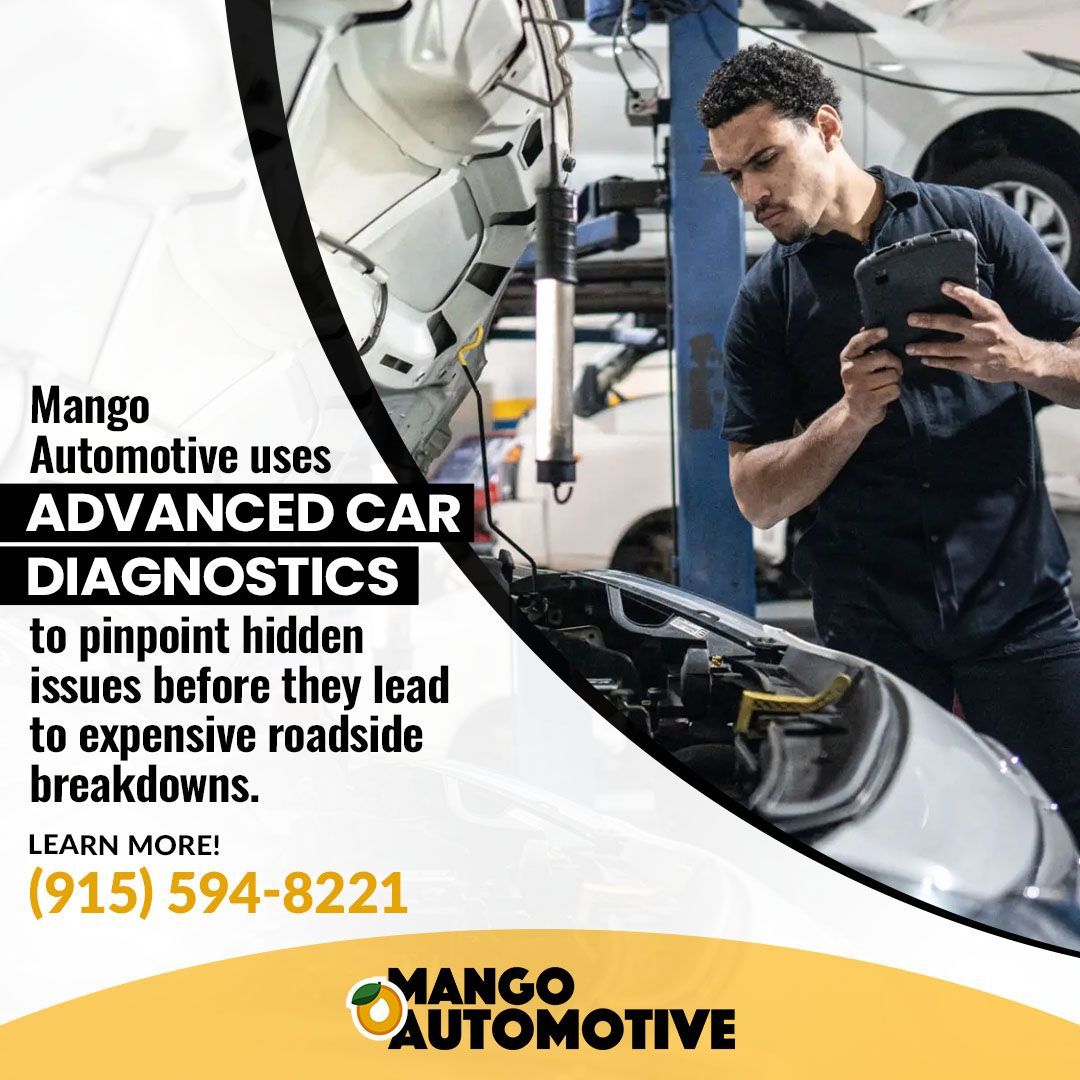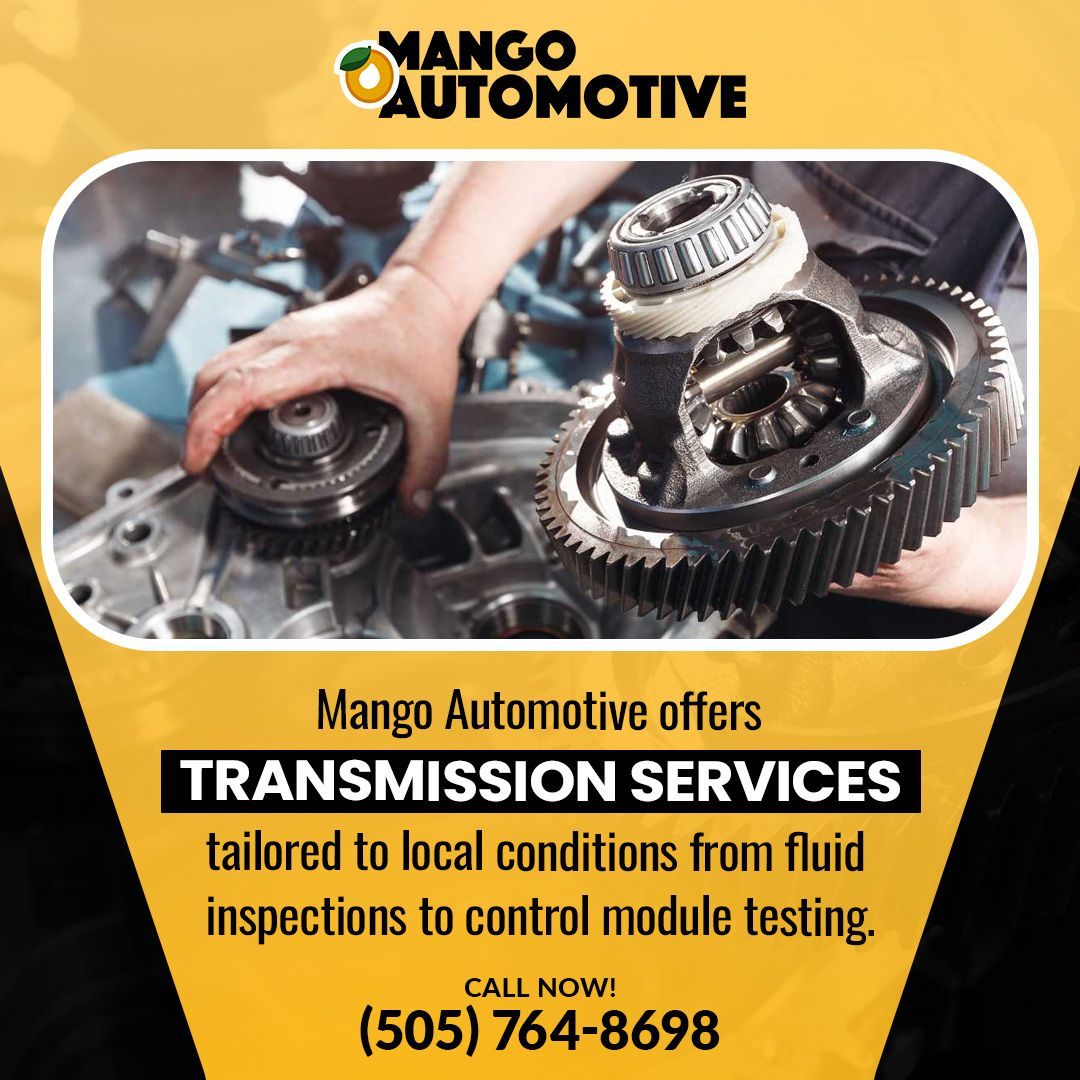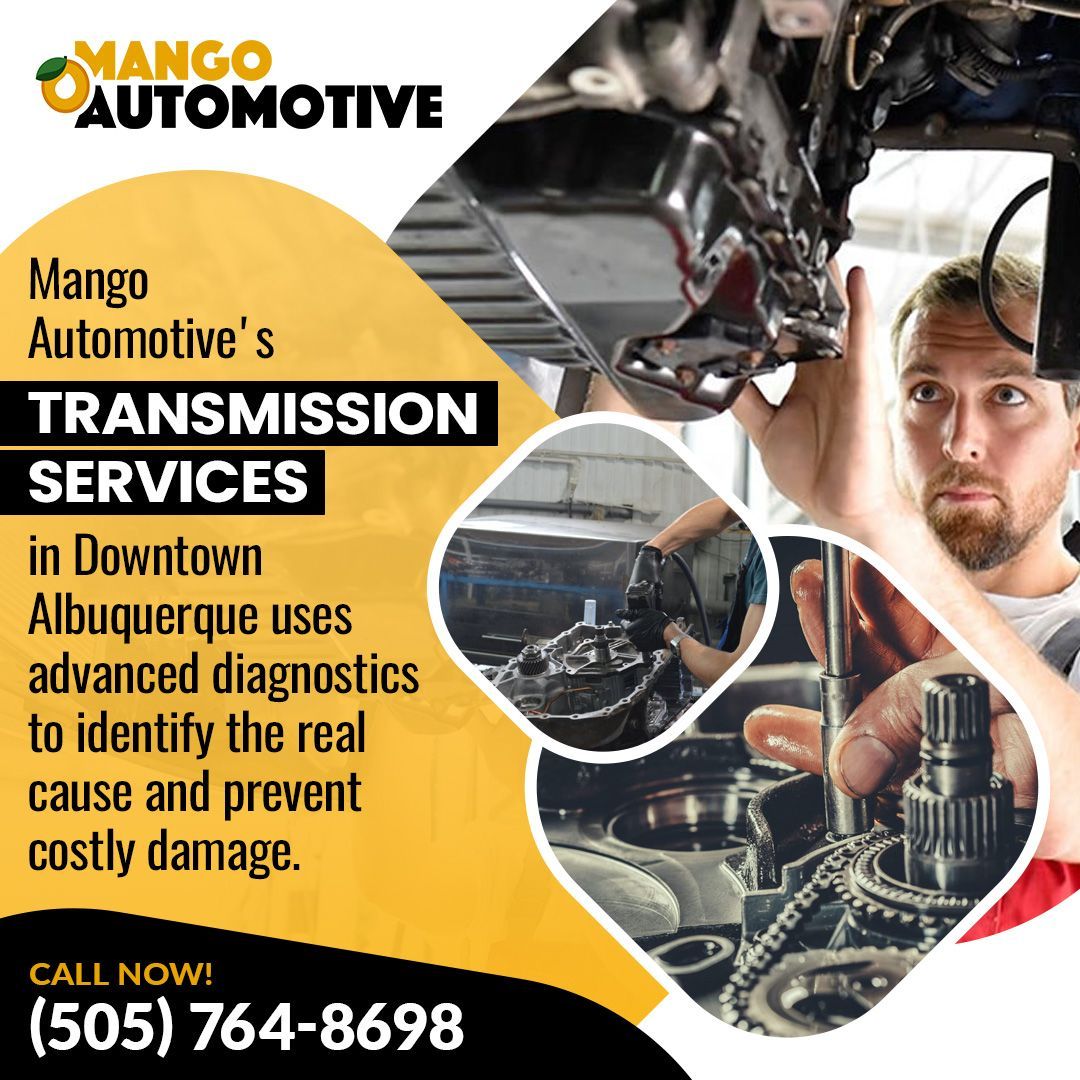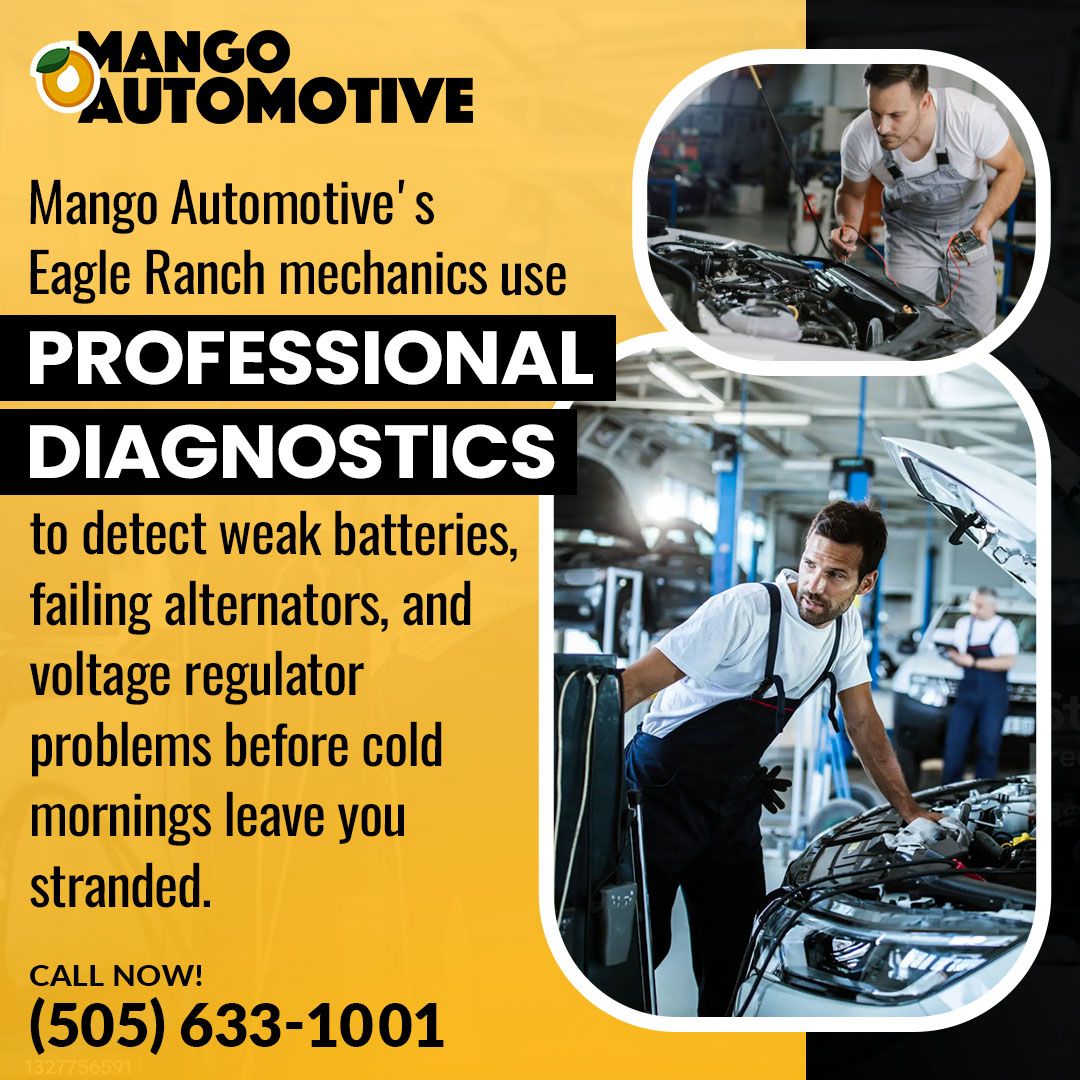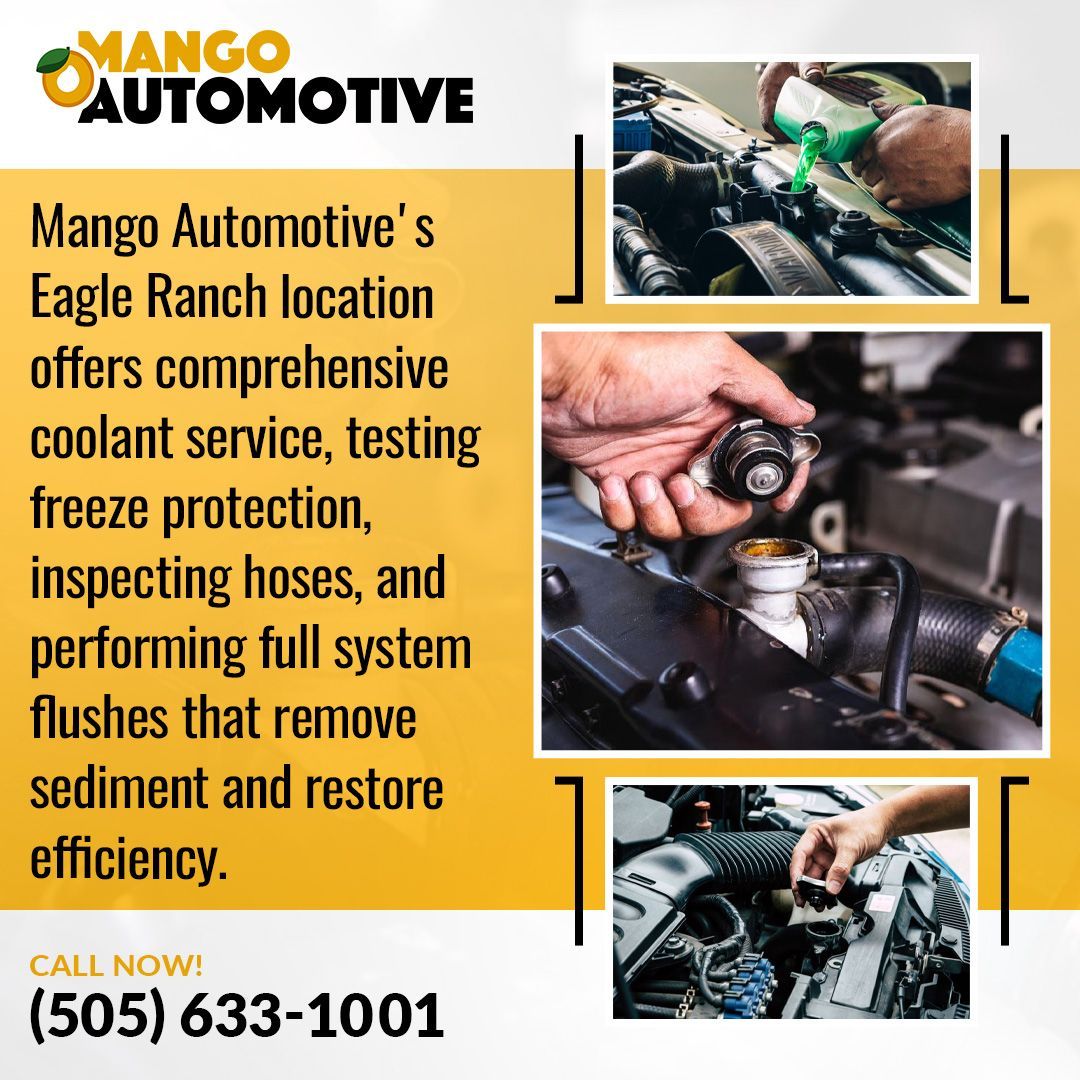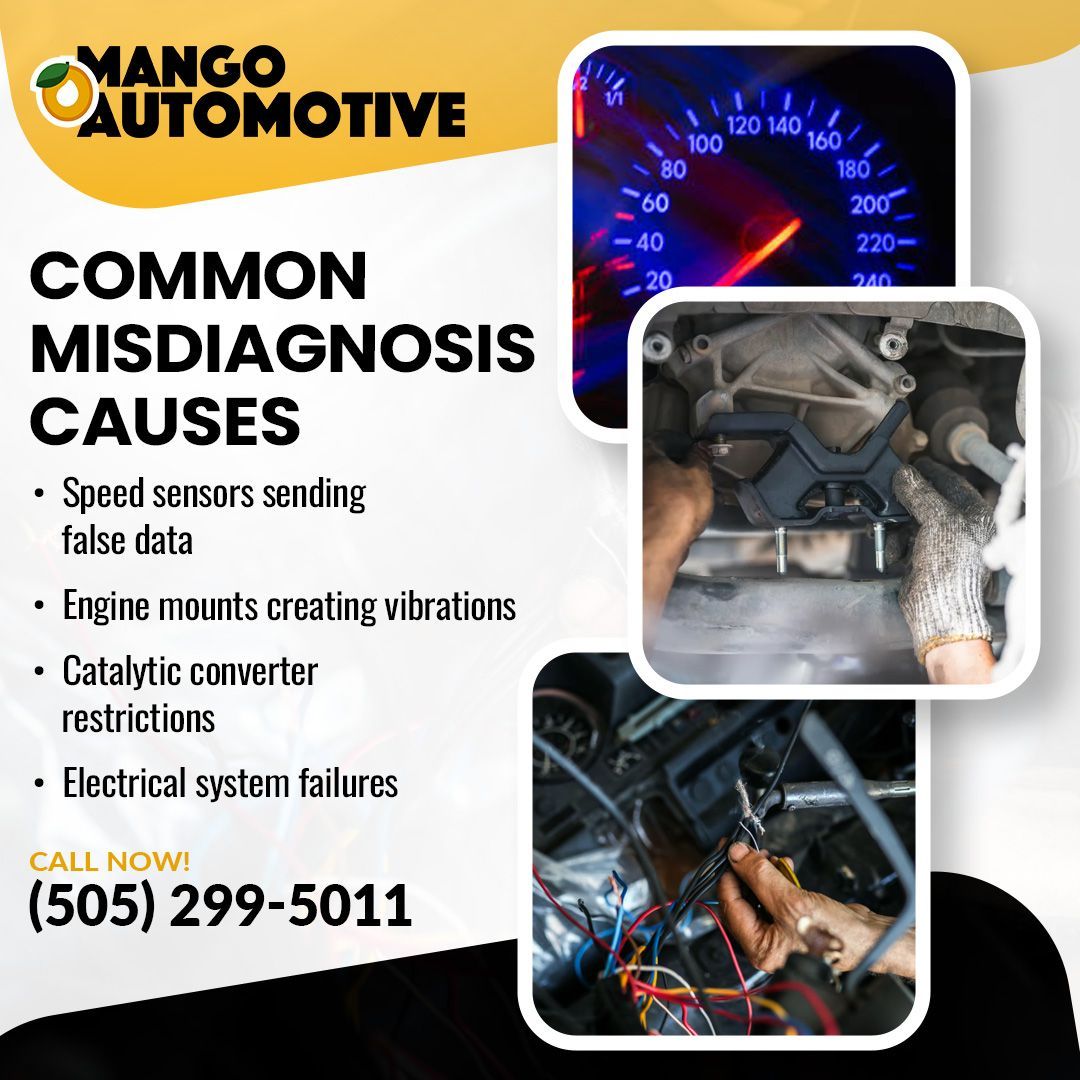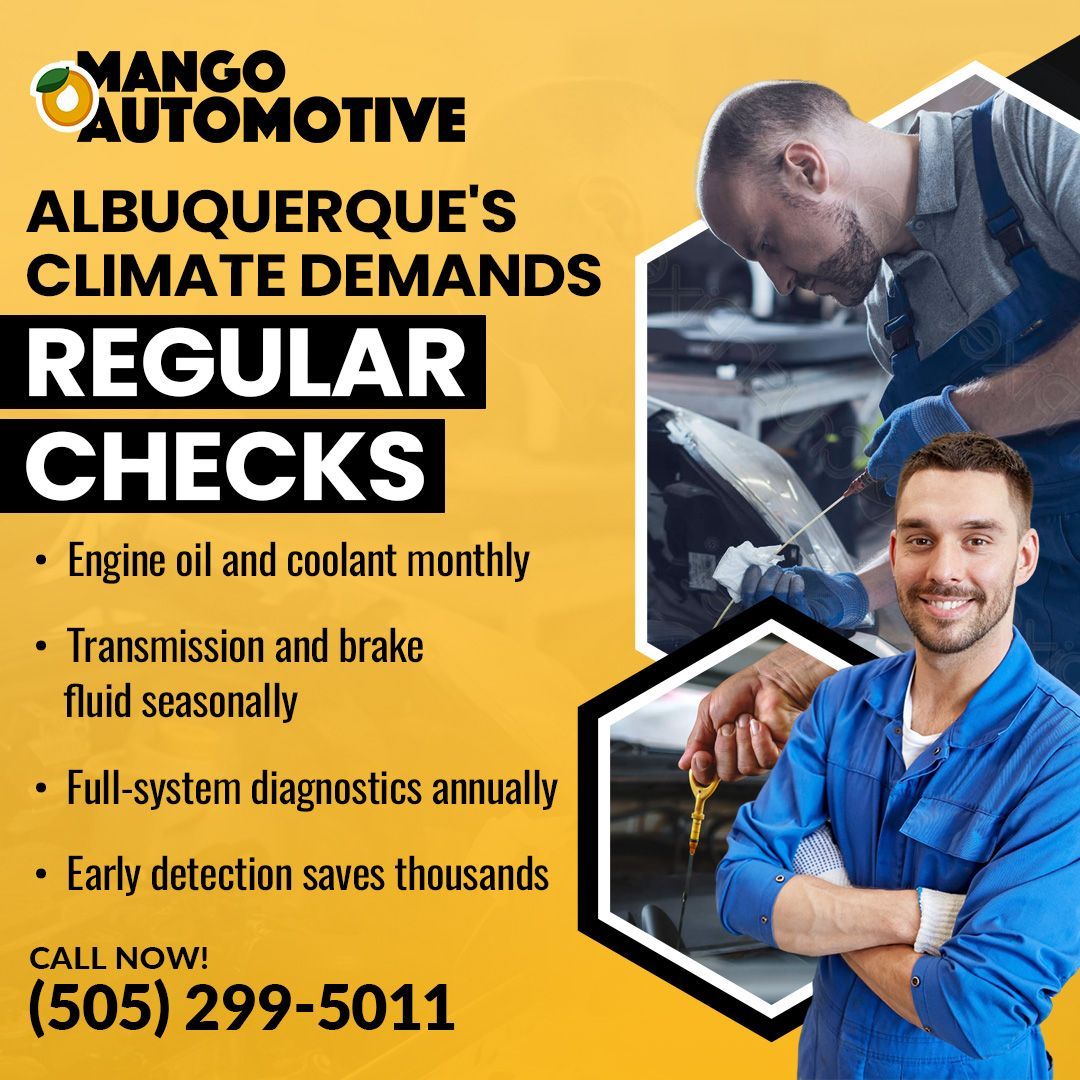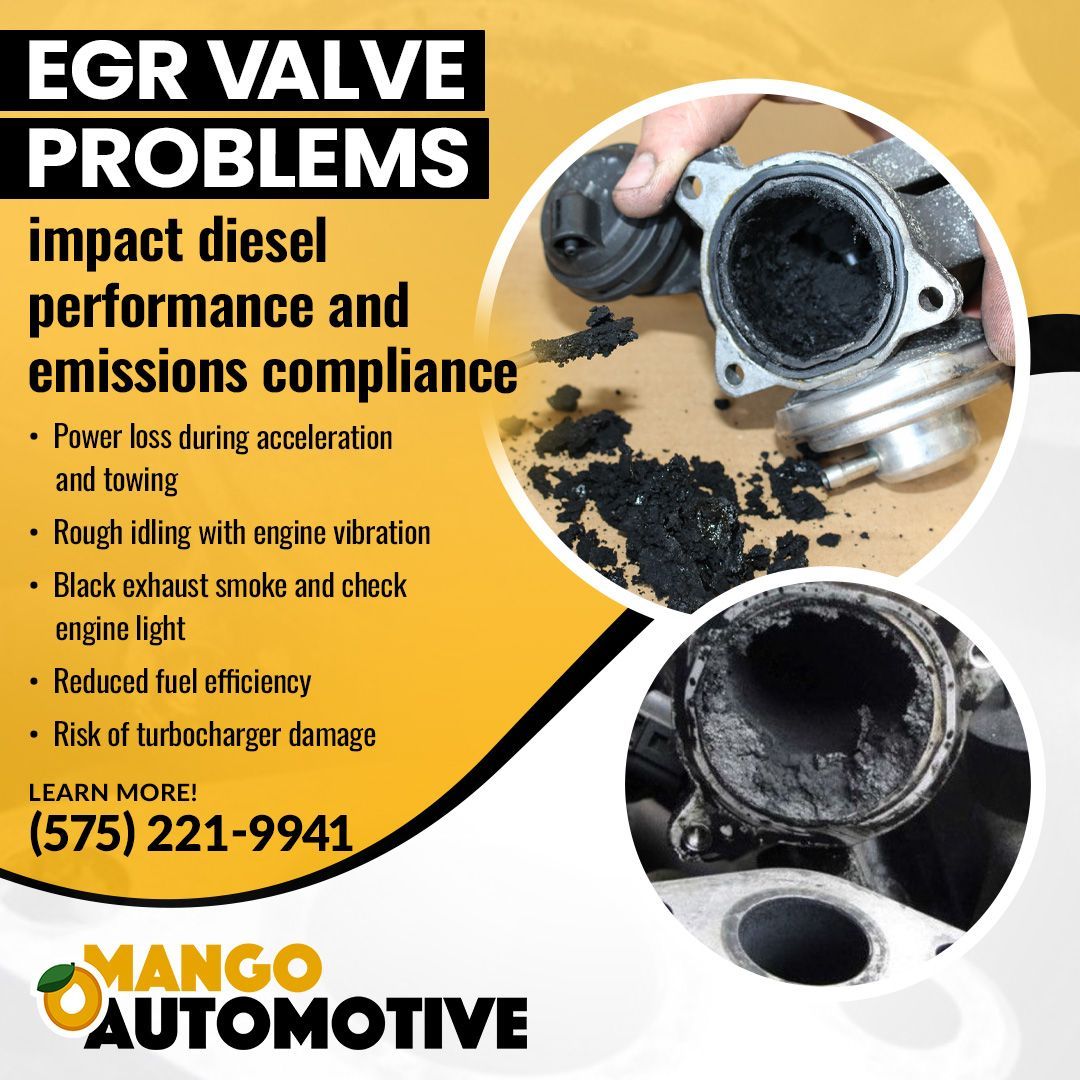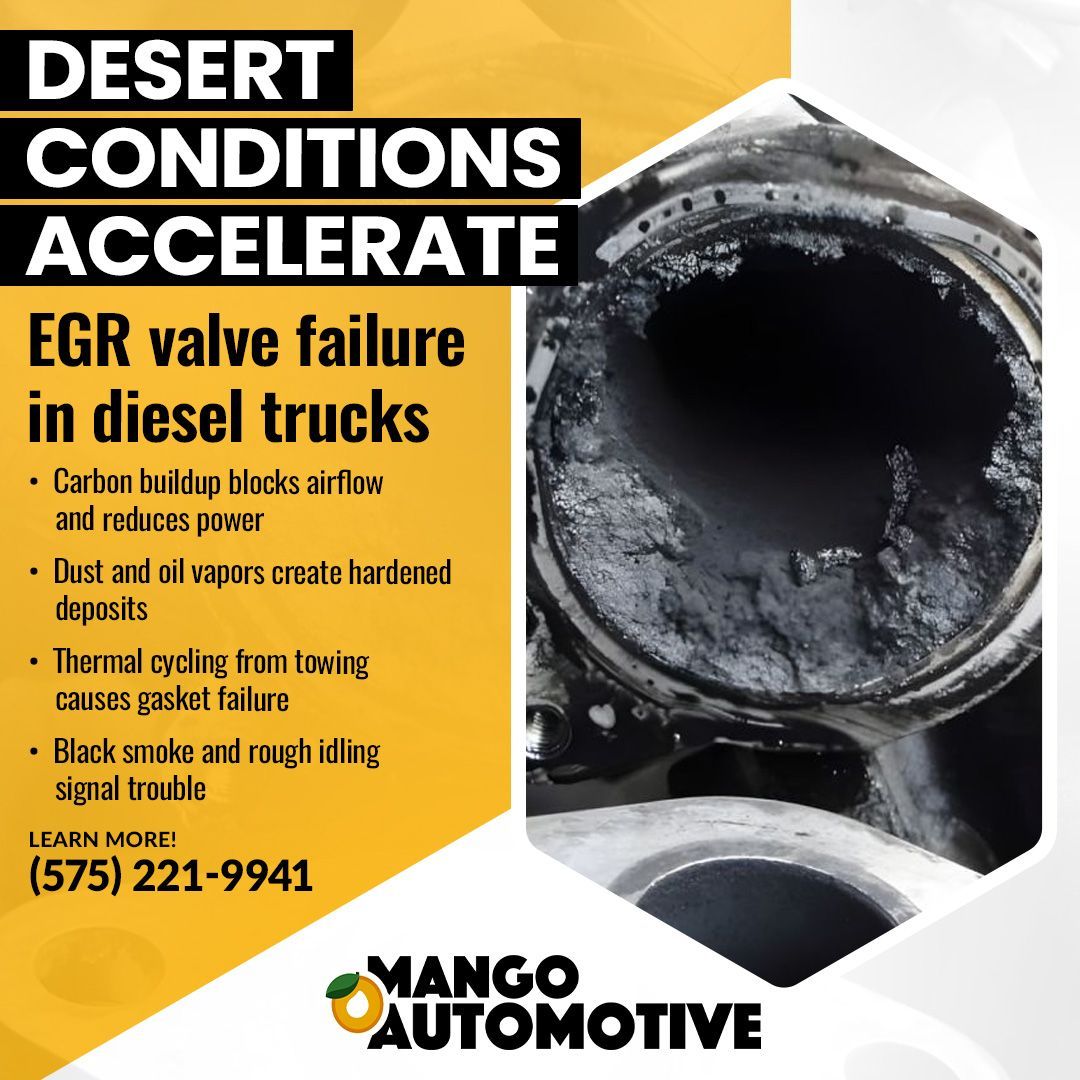Top 5 Repairs for SUVs: Your Auto Shop in Albuquerque Explains
SUVs and pickup trucks now make up 75% of total U.S. car sales in 2024, with SUVs alone capturing 58% of all vehicle transactions according to recent industry data. Given this market dominance, SUV owners need to understand the maintenance challenges these vehicles present. They require specialized maintenance due to their size and weight. Their larger size means more stress on parts. Their weight requires stronger braking systems. Many families use SUVs for towing and hauling, which adds extra wear on components. At Mango Automotive (Downtown) in Albuquerque, we understand these challenges and help SUV owners maintain their vehicles safely and reliably.
Understanding these common automotive repair needs helps SUV owners spot warning signs early. Early detection prevents small problems from becoming big headaches. This knowledge also helps families plan for vehicle maintenance and find trusted
auto repair in Downtown Albuquerque.
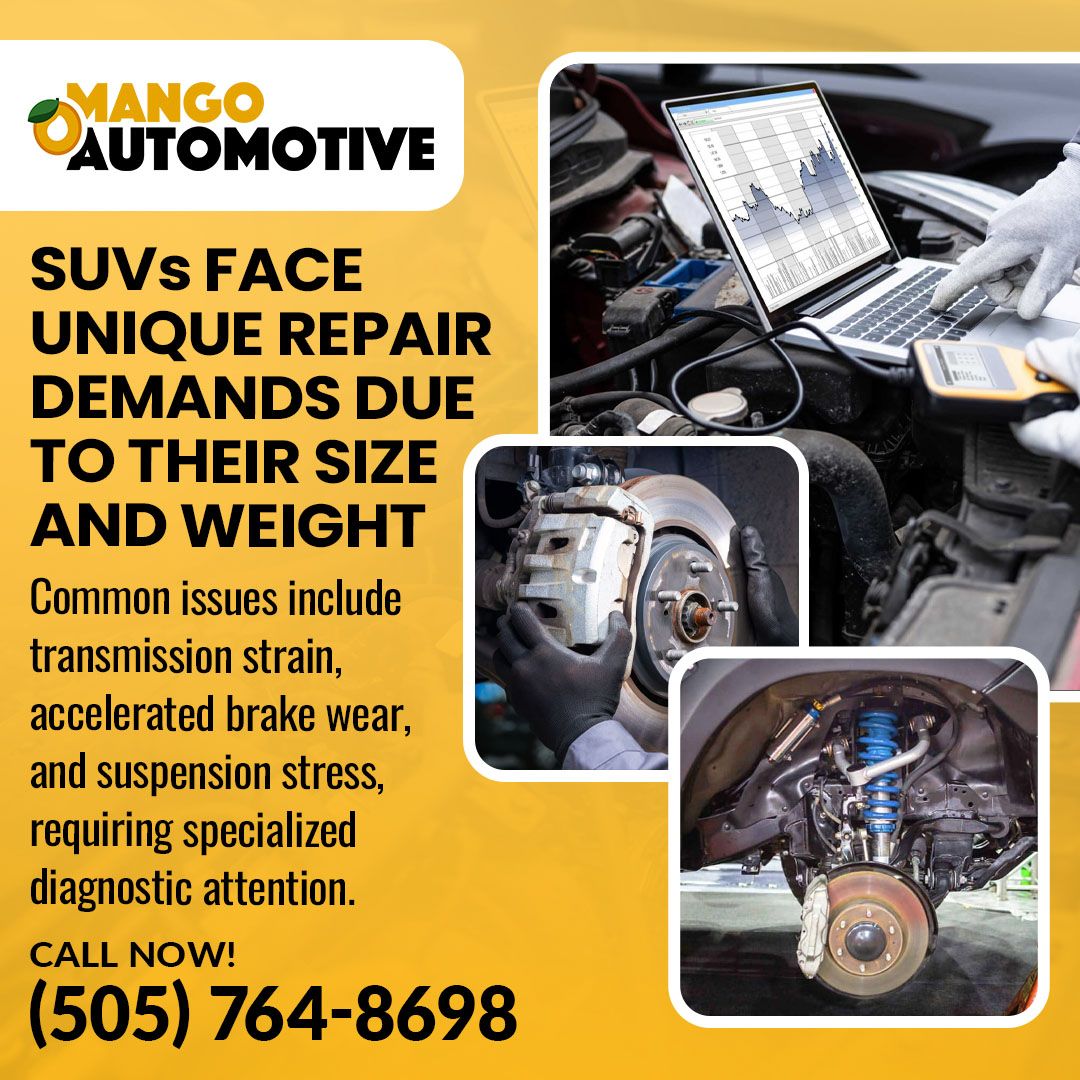
The Five Most Common SUV Repairs
SUV owners typically encounter five main repair categories during their vehicle's lifetime. Each category has specific warning signs and maintenance needs. These are:
Transmission Problems - Issues with gear shifting, fluid leaks, and electronic controls that affect how power moves from the engine to the wheels.
Brake System Repairs - Worn brake pads, damaged rotors, and brake fluid problems that impact your ability to stop safely.
Air Conditioning Failures - Compressor problems, refrigerant leaks, and airflow issues that prevent proper cabin cooling.
Suspension Component Wear - Shock absorbers, struts, and steering parts that affect ride comfort and vehicle control.
Engine Performance Issues - Check engine lights, fuel system problems, and ignition troubles that reduce power and fuel efficiency.
Each of these repair areas connects to the others. For example, worn suspension parts can cause uneven tire wear, which affects braking performance. Understanding these connections helps you maintain your SUV more effectively.
Transmission System Problems
Transmission problems create the most expensive SUV repairs and should receive immediate attention when symptoms appear. The transmission system moves power from the engine to the wheels. SUV transmissions work harder than car transmissions because they handle more weight and often tow heavy loads. This extra work means transmission parts wear out faster.
Common Transmission Warning Signs
Slipping gears happens when your transmission cannot hold gears properly. You might notice the engine revving higher without the SUV speeding up. This usually means internal parts are worn and need replacement.
Rough shifting creates jerky movements when changing gears. The SUV might jolt or hesitate between gears. This often starts small but gets worse over time if not addressed.
Strange noises
from the transmission area can sound like whining, grinding, or clunking. These sounds indicate worn internal parts that need professional attention from an auto repair shop near you.
Transmission Fluid Issues
Transmission fluid keeps internal parts lubricated and helps transfer power smoothly. Red or brown puddles under your parked SUV indicate transmission fluid leaks. Fresh transmission fluid appears bright red, while old or burnt fluid looks dark brown or black.
Low fluid levels prevent proper operation and can damage internal components quickly. Most modern SUVs do not have dipsticks for checking fluid, so regular professional inspections are important. Burnt fluid produces a strong, unpleasant smell and indicates overheating problems. This condition requires immediate attention to prevent major internal damage.
Electronic Control Problems
Modern SUV transmissions use computers to control shifting patterns. These systems monitor engine speed, vehicle speed, and throttle position to determine the best gear for each situation. Sensor failures can cause erratic shifting or prevent the transmission from working properly. The check engine light often appears when transmission sensors malfunction. Software updates sometimes fix transmission problems without replacing parts. Manufacturers occasionally release updates to improve shift quality or address specific issues.
At Mango Automotive, our transmission specialists understand the complexity of modern SUV transmissions. We use advanced diagnostic equipment to identify whether problems stem from mechanical wear, electronic malfunctions, or simple maintenance needs. From routine transmission service to complete system overhauls, our
auto shop in Albuquerque helps keep your SUV's transmission running smoothly.
Brake System Maintenance
SUV brake systems work harder than car brakes due to increased vehicle weight and frequent towing use. Heavier vehicles need more stopping power to slow down safely. This extra demand wears out brake parts faster and creates more heat during braking. Heat can warp brake rotors and reduce braking effectiveness.
Brake Pad and Rotor Care
Brake pads press against rotors to create the friction that stops your SUV. These pads wear down gradually and need replacement when they get too thin. Squealing sounds during braking usually mean brake pads are getting thin and need replacement soon. Ignoring these sounds can lead to metal-on-metal contact that damages rotors.
Grinding noises indicate the brake pads are completely worn and the metal parts are touching. This situation damages rotors and creates expensive repairs.
Shaking or vibration through the brake pedal often means rotors are warped from excessive heat. Warped rotors need resurfacing or replacement to restore smooth braking.
Brake Fluid System
Brake fluid transfers the force from the brake pedal to the brake pads at each wheel. A spongy brake pedal feel indicates air in the brake lines or worn master cylinder parts. Air bubbles compress when you press the pedal, reducing braking power.
Dirty brake fluid should be replaced to prevent internal corrosion and maintain proper system function. Fresh brake fluid appears clear or light amber in color. Brake fluid leaks reduce stopping power and create safety hazards. Common leak locations include brake lines, calipers, and the master cylinder reservoir.
Brake Hardware Problems
Brake calipers squeeze the brake pads against rotors when you press the pedal. Stuck calipers cause uneven pad wear and may make the SUV pull to one side during braking. Brake hardware includes springs, clips, and other small parts that keep brake pads positioned correctly. Worn hardware can cause brake noise and uneven pad wear. Regular brake inspections help identify worn components before they cause problems or safety hazards.
Safety is our top priority at Mango Automotive, which is why we provide thorough brake system inspections and repairs. Our certified
auto repair technicians examine all brake components. Our brake services in Albuquerque include pad and rotor replacement, brake fluid exchanges, and complete system diagnostics to keep your family safe on the road.
Air Conditioning System Repairs
AC compressor problems account for most air conditioning failures in SUVs, especially during hot summer months. SUV air conditioning systems have to cool larger interior spaces. This extra work wears out AC components faster.
AC Compressor Issues
The AC compressor pressurizes refrigerant and circulates it through the cooling system. This part runs continuously when the air conditioning operates, making it prone to wear and failure. Warm air from vents when the AC is running usually indicates compressor problems or low refrigerant levels. The system should produce cold air within a few minutes of operation.
Grinding or squealing noises from the engine area when the AC runs often mean compressor bearings are failing. These internal parts support rotating components and need lubrication to work properly. Compressor clutch problems prevent the AC system from engaging with engine power. The clutch connects and disconnects compressor operation based on cooling needs.
Refrigerant System Problems
Refrigerant absorbs heat from cabin air and releases it outside the vehicle through the condenser. Refrigerant leaks reduce cooling capacity and can damage compressor components. Small leaks develop gradually, while larger leaks cause sudden cooling loss.
Low refrigerant levels prevent proper cooling and may cause compressor damage from a lack of lubrication. The system needs adequate refrigerant to function safely. Blocked condenser fins reduce heat transfer and cooling efficiency. Road debris, leaves, and dirt can accumulate on the condenser and block airflow.
AC System Components
The evaporator removes heat from cabin air and is located behind the dashboard. Clogged evaporators restrict airflow and may cause musty odors from air vents. Cabin air filters clean the air entering the passenger compartment and need regular replacement. Dirty filters reduce airflow and cooling efficiency. Sometimes, a simple cabin air filter problem can cause AC issues that seem complex.
Many SUV owners experience frustrating AC problems that other shops cannot diagnose properly. One of our customers shared their
experience: "Had to get a new A/C compressor last year and since then my jeep has been making a funny noise and the A/C would warm up during idle. Drove me crazy for a year and other mechanics told me it was normal or they couldn't find the problem. I searched high and low myself and couldn't figure it out but when I asked the Downtown Mango shop to take a look they figured it out and fixed for me!! It was so simple too (something to do with cabin air filter) and not something I would have considered. I am so thankful to have a fully functioning A/C again."
This experience demonstrates our diagnostic approach at Mango Automotive. While other mechanics dismissed the problem as normal, our technicians at our auto shop in Albuquerque investigated further and discovered the actual cause. Sometimes the most frustrating problems have simple solutions when you know where to look. We provide comprehensive car AC repairs, including compressor replacement, refrigerant leak detection, condenser cleaning, and complete system evacuations and recharges.
Suspension and Steering Repairs
SUV suspension systems experience more stress than car suspensions due to higher vehicle weight and center of gravity. Suspension parts control how your SUV rides and handles on the road. These components keep tires in contact with pavement and prevent excessive bouncing or rolling during turns.
Shock Absorber and Strut Replacement
Shock absorbers control spring movement and prevent bouncing after hitting bumps or dips in the road. Worn shocks allow continued bouncing and reduce tire grip during braking and turning. Excessive bouncing after hitting road irregularities indicates worn shock absorbers. You can test this by pushing down on each corner of your SUV - it should bounce once and stop.
Oil leaks on shock absorber bodies show internal seal failure and reduced damping ability. Leaking shocks cannot control suspension movement properly. Strut assemblies combine shock absorber and spring functions in one unit. These components support vehicle weight while controlling movement and maintaining wheel alignment.
Steering System Components
Ball joints connect suspension parts and allow wheels to turn while moving up and down over road surfaces. Worn ball joints create clunking noises and may affect steering precision. Control arm bushings reduce noise and vibration while allowing suspension movement. Rubber bushings deteriorate over time and may cause steering wander or handling problems. Power steering systems reduce the effort needed to turn the steering wheel. These systems use hydraulic pressure to assist steering input from the driver.
Power Steering Maintenance
Power steering fluid lubricates system components and transfers hydraulic pressure to the steering gear. Hard steering, especially at low speeds, often indicates power steering problems such as low fluid levels or pump failure. The system should provide easy steering effort in all conditions.
Whining noises during steering operation usually indicate power steering pump problems or low fluid levels. These sounds often get worse when turning the wheel fully in either direction. Power steering fluid leaks appear as puddles under the front of the vehicle. Common leak sources include pump seals, hoses, and steering rack components.
At Mango Automotive, we provide complete inspections of shock absorbers, struts, ball joints, and steering components. Our alignment services help prevent premature tire wear and improve handling. Whether your SUV needs routine suspension maintenance or major component replacement, our experienced auto repair technicians use quality parts and precision techniques to restore proper ride quality and steering control.
Engine Performance Problems
Check engine lights indicate problems detected by the engine computer and should receive a prompt professional diagnosis. Modern SUV engines use complex systems to control performance, fuel economy, and emissions. When problems develop, warning lights alert drivers to potential issues that need attention.
Diagnostic Warning Lights
Check engine lights activate when the engine computer detects system malfunctions. These warnings can indicate minor sensor problems or serious engine issues that need immediate attention.
OBD-II (On-Board Diagnostics) systems store error codes that help technicians identify problem areas. Professional scan tools retrieve these codes and provide starting points for diagnosis. Flashing check engine lights indicate serious problems, such as engine misfires, that can damage expensive components like catalytic converters. These situations require immediate attention.
Common Engine Issues
Engine misfires occur when fuel does not burn properly in one or more cylinders. Symptoms include rough idling, reduced power, and poor fuel economy. Fuel system problems can affect engine performance and include clogged fuel injectors, dirty fuel filters, and failing fuel pumps. These issues develop gradually over time. Ignition system components, such as spark plugs and ignition coils, wear out and need periodic replacement. Worn ignition parts cause misfires and reduced engine performance.
Air and Fuel System Maintenance
Clean air filters allow proper airflow into the engine and affect fuel mixture quality. Dirty air filters restrict airflow and may trigger diagnostic codes or reduce engine power. Most air filters need replacement every 12,000 to 15,000 miles. Fuel injectors deliver precise amounts of fuel to each engine cylinder. Contaminated fuel or lack of maintenance can cause injector clogs that affect performance.
Regular maintenance prevents most engine performance problems and helps identify issues before they cause major damage. Professional diagnostics can detect problems early and save
automotive repair expenses.
At Mango Automotive, our certified technicians use advanced diagnostic equipment to identify engine performance issues quickly and accurately. Our diagnostic services include check engine light diagnosis, emissions testing, fuel system cleaning, and ignition system maintenance. We explain problems clearly and provide honest recommendations to keep your SUV running at peak performance.
Preventive Maintenance
Regular maintenance schedules help prevent many common SUV problems and extend component life. Following manufacturer recommendations provides baseline service intervals for normal driving conditions.
Severe service conditions, such as frequent towing, stop-and-go city driving, dusty environments, and extreme temperature operation, require more frequent maintenance. Professional inspections identify potential problems before complete component failure occurs. Early detection saves money and prevents roadside breakdowns that strand families.
Quality parts and fluids that meet manufacturer specifications provide expected service life. Using proper components maintains warranty coverage and vehicle reliability for ongoing auto repair needs.
Mango Automotive: Expert SUV Repair Services in Albuquerque
At Mango Automotive, we bring together all these specialized services under one roof for complete SUV care. Our experienced technicians understand how these systems interconnect and affect each other. When you choose us for your SUV maintenance and repairs, you get comprehensive service that addresses your vehicle's needs as a complete system, not just individual components.
Our transparent approach means you understand what repairs your SUV needs and why they are recommended. We explain problems clearly and provide detailed estimates before beginning any work.
We use quality replacement parts and back our auto repair in Downtown Albuquerque with an industry-leading
warranty coverage of 60-month/60,000-mile. Our technicians stay current with SUV technology and repair procedures through ongoing training.
Regular maintenance partnerships help prevent expensive automotive repairs and keep your SUV reliable for family use. We work with SUV owners to develop maintenance schedules that fit their driving needs and budgets. Our VIP membership program offers additional benefits, including priority scheduling, exclusive discounts, and complimentary services to help you save money while maintaining your family's vehicle.
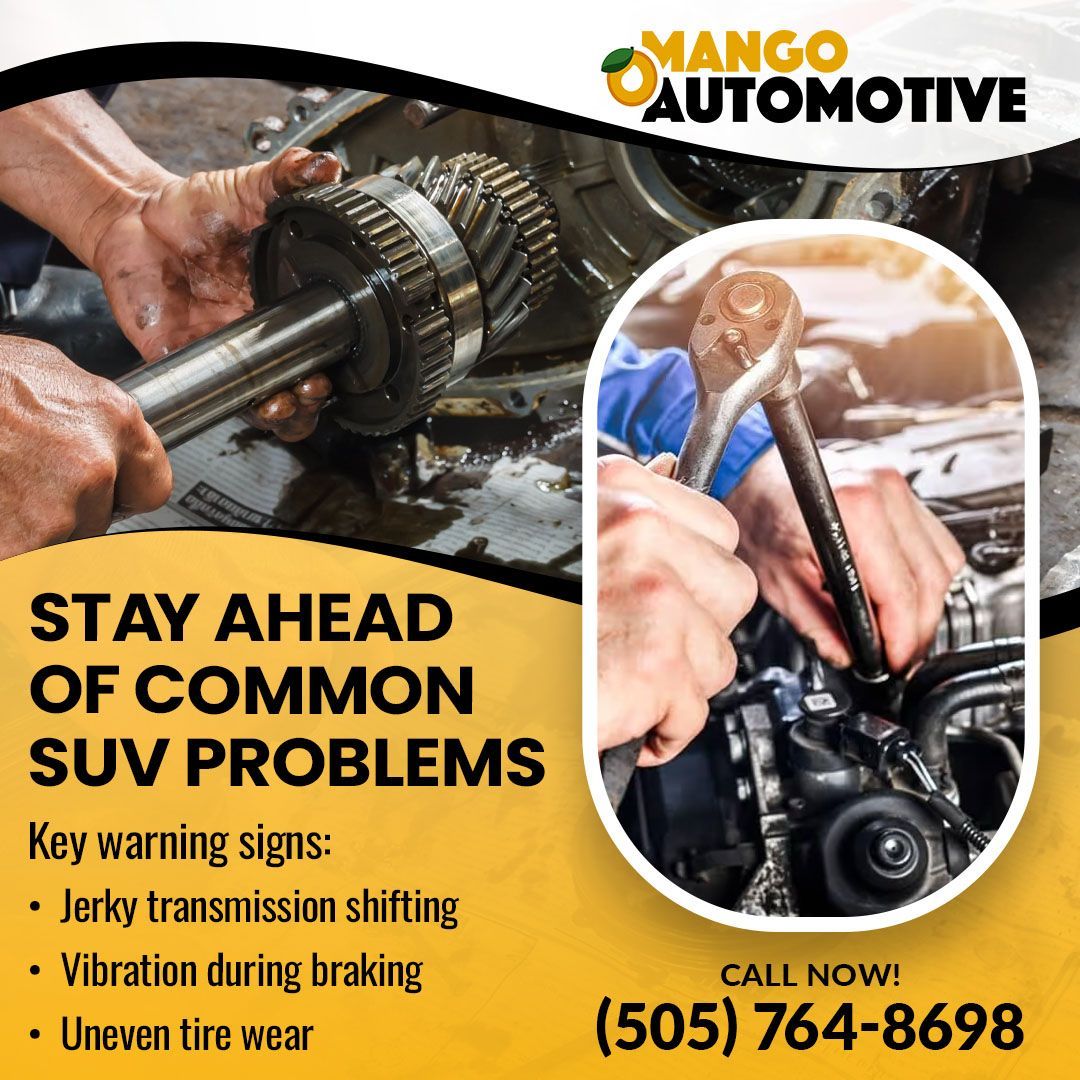
Professional Auto Repair in Downtown Albuquerque for Your SUV
Keep your family SUV running safely and reliably with professional automotive repair services. Contact Mango Automotive at (505) 764-8698 to schedule your maintenance appointment. With years of experience as a leading auto shop in Albuquerque, our team understands what your family's SUV needs.
